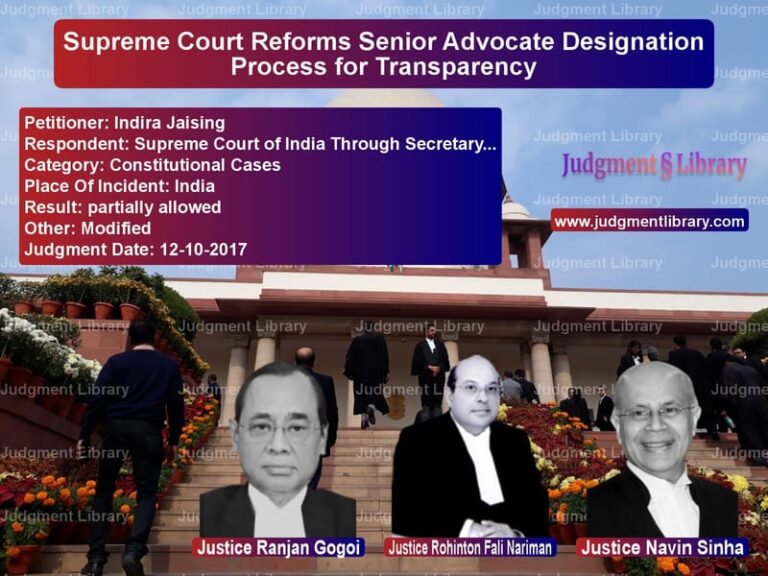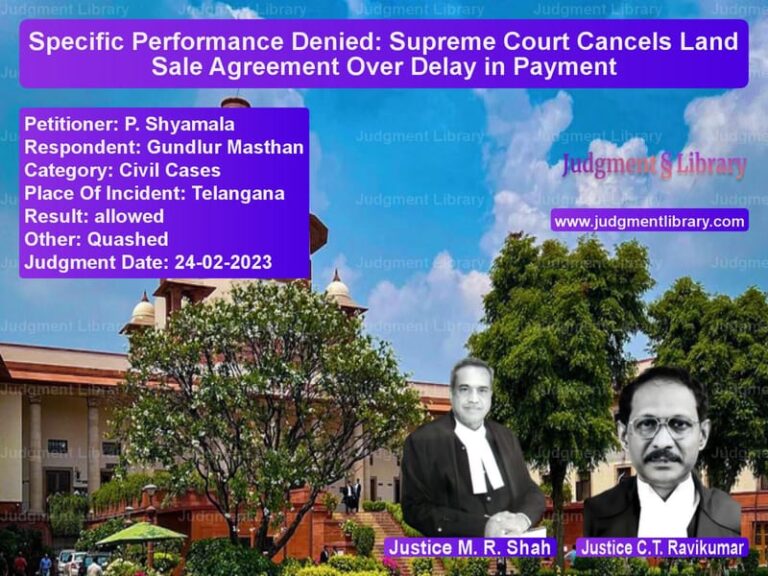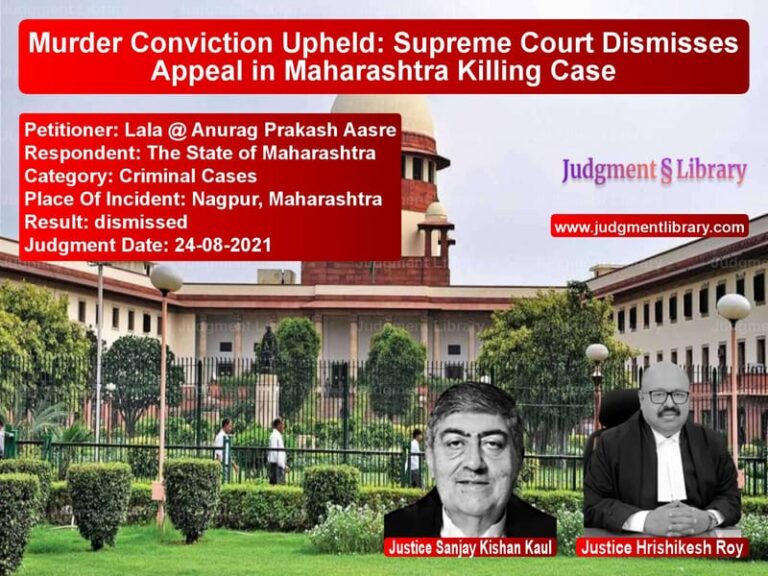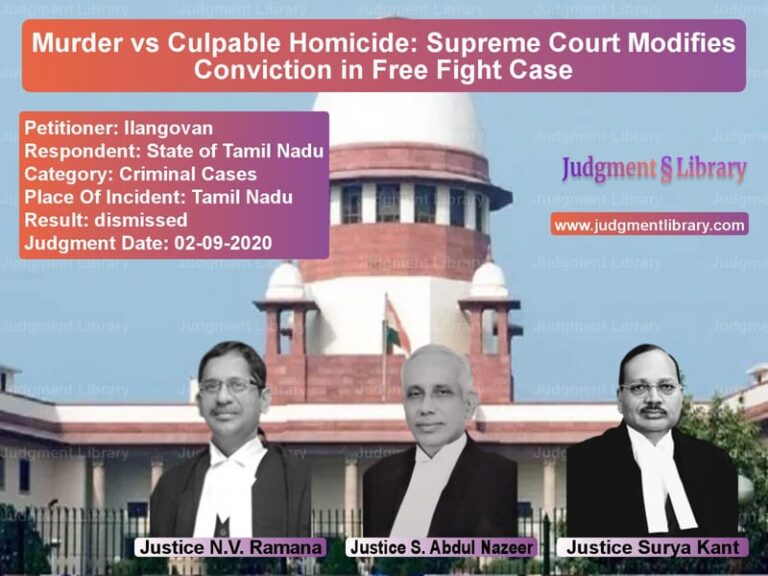Supreme Court Strikes Down Gujarat’s Ban on Sand Transport
The Supreme Court of India, in the case of State of Gujarat & Ors. vs. Jayeshbhai Kanjibhai Kalathiya & Ors., struck down the Gujarat government’s rules prohibiting the transport of sand outside the state. The judgment provides a significant precedent concerning the powers of state governments in regulating minor minerals and highlights the constitutional limitations under Article 301 of the Indian Constitution.
Background of the Case
The dispute began when the Gujarat government issued a resolution prohibiting leaseholders, stockists, and traders from transporting ordinary sand excavated within the state to other states or countries. This was followed by an amendment to the Gujarat Minor Mineral Rules, 1966, introducing Rule 44-BB, which categorically prohibited the transport of sand beyond Gujarat’s borders. Later, Rule 71 of the Gujarat Minor Mineral Concession Rules, 2010, replaced Rule 44-BB but retained the same prohibition.
Several petitioners, including sand leaseholders and traders, challenged these restrictions before the Gujarat High Court, arguing that the rules exceeded the state’s legislative competence under the Mines and Minerals (Development and Regulation) Act, 1957 (MMDR Act) and violated the fundamental right to trade under Article 301 of the Constitution.
High Court’s Decision
The Gujarat High Court ruled in favor of the petitioners, striking down the state’s restrictions on sand transport as ultra vires and unconstitutional. It held that:
- The rule-making power under the MMDR Act does not extend to prohibiting the movement of minerals across state borders.
- Such restrictions violate the constitutional guarantee of free trade under Article 301.
- The rule was not justified under Article 304, which permits reasonable restrictions on trade.
Aggrieved by this decision, the State of Gujarat appealed before the Supreme Court.
Arguments by the Petitioner (State of Gujarat)
The Gujarat government defended the restrictions by arguing that:
- Under Section 15 of the MMDR Act, the state government has wide powers to regulate minor minerals.
- The prohibition aimed to prevent illegal mining and excessive depletion of sand.
- Environmental concerns warranted restrictions on the transport of sand to ensure sustainable development.
- Several High Courts, including Andhra Pradesh and Madras, had upheld similar restrictions.
Arguments by the Respondents (Jayeshbhai Kanjibhai Kalathiya & Ors.)
The respondents argued that:
- The MMDR Act grants states the power to regulate mining but not to prohibit interstate trade.
- The restrictions directly violate Article 301, which guarantees free trade across India.
- Regulating the extraction of sand is within the state’s power, but restricting its movement beyond state borders is unconstitutional.
- The Gujarat High Court’s ruling was in line with constitutional principles and should be upheld.
Supreme Court’s Observations
The Supreme Court analyzed the MMDR Act and the constitutional framework governing trade restrictions. It made the following key observations:
- Section 15 of the MMDR Act empowers states to regulate the grant of mining leases and concessions but does not authorize them to ban the movement of minerals.
- Section 23-C allows states to frame rules for preventing illegal mining, but this does not extend to restrictions on legally mined minerals.
- The power to regulate trade and commerce resides with the Parliament under Article 302, and states cannot impose such restrictions unless permitted by law.
- Restrictions on trade must be reasonable and justifiable under Article 304, which Gujarat failed to demonstrate.
The Court also rejected the state’s reliance on environmental concerns, stating that while conservation is important, an outright ban on transport without justification is excessive and unconstitutional.
Supreme Court’s Judgment
The Supreme Court upheld the Gujarat High Court’s decision and struck down the prohibitory rules as unconstitutional. The key rulings included:
- The ban on the transport of sand beyond Gujarat’s borders was beyond the powers granted under the MMDR Act.
- The restrictions violated Article 301 of the Constitution, which ensures the free movement of goods across states.
- The Gujarat government failed to justify the restrictions under Article 304, which allows states to impose reasonable restrictions in the public interest.
- The ruling overruled contrary judgments from the Andhra Pradesh and Madras High Courts.
The Court concluded:
“The power to regulate mining under Section 15 of the MMDR Act does not include the power to prohibit the sale or transport of legally mined minerals beyond the state’s borders. Such restrictions violate the constitutional guarantee of free trade and are therefore struck down.”
Conclusion
This judgment reaffirms the constitutional principle that states cannot impose arbitrary restrictions on trade and commerce. While states have the authority to regulate mining activities, they cannot prohibit the transport of legally mined minerals without proper justification. The ruling sets an important precedent for balancing environmental concerns with economic and constitutional rights.
Petitioner Name: State of Gujarat & Ors..Respondent Name: Jayeshbhai Kanjibhai Kalathiya & Ors..Judgment By: Justice A.K. Sikri, Justice S. Abdul Nazeer, Justice M.R. Shah.Place Of Incident: Gujarat.Judgment Date: 01-03-2019.
Don’t miss out on the full details! Download the complete judgment in PDF format below and gain valuable insights instantly!
Download Judgment: State of Gujarat & O vs Jayeshbhai Kanjibhai Supreme Court of India Judgment Dated 01-03-2019.pdf
Direct Downlaod Judgment: Direct downlaod this Judgment
See all petitions in Legislative Powers
See all petitions in Fundamental Rights
See all petitions in Public Interest Litigation
See all petitions in Judgment by A.K. Sikri
See all petitions in Judgment by S. Abdul Nazeer
See all petitions in Judgment by Mukeshkumar Rasikbhai Shah
See all petitions in dismissed
See all petitions in Quashed
See all petitions in supreme court of India judgments March 2019
See all petitions in 2019 judgments
See all posts in Constitutional Cases Category
See all allowed petitions in Constitutional Cases Category
See all Dismissed petitions in Constitutional Cases Category
See all partially allowed petitions in Constitutional Cases Category







